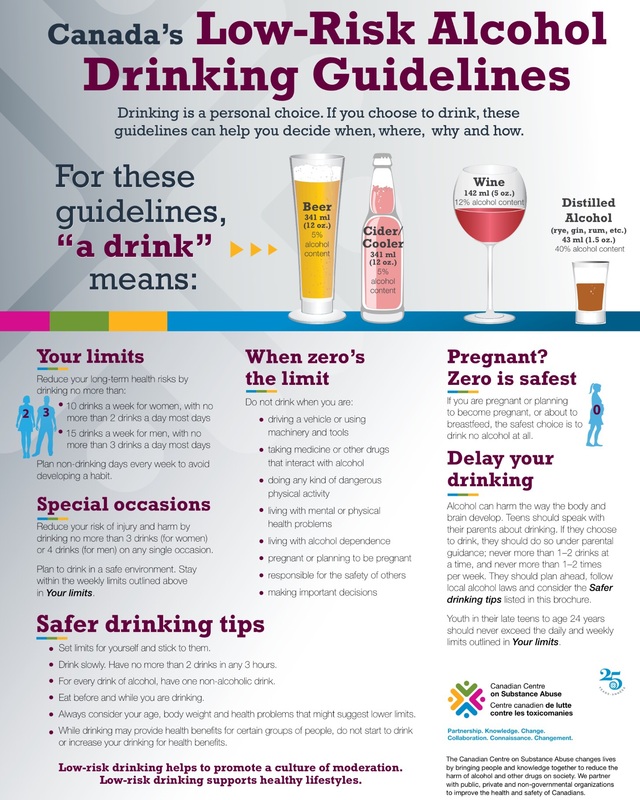
|
Merry Christmas from all of us at Beyond The Body! We wish you all a safe and happy holiday season!
Tis the season to be jolly, but remember to drink responsibly! Check out the handy low-risk drinking guidelines below from the Canadian Centre on Substance Abuse. And don't forget to read up on the CAMH's tips for reducing stress during the holidays to avoid becoming a Scrooge! http://camhblog.com/2014/12/22/nyac-holiday-survival-tips/  PTSD is an expensive injury to treat. 21% of American soldiers returning from Iraq and Afghanistan suffer from PTSD, with many more cases likely gone unreported. Soldiers with PTSD cost 3.5 times more to treat than soldiers without PTSD, equating to nearly $1 billion dollars annually. But now a new avenue for combating operational stress injuries and PTSD is finishing a major clinical trial; the Stress Resilience Training System, publicized by the US Navy in early 2013 here. It's an app developed for the iPad that works with a small heart monitor to provide soldiers with education and training supplemented by realtime biofeedback data. It purports to give soldiers the tools necessary to respond adaptively to real-world stress, reducing incidences of PTSD, reducing healthcare costs, smoothing transitions to civilian life, and improving lives. Here is a link to the instructional video that introduces soldiers to their new tools in the fight against PTSD. Does meditating help improve levels of psychological stress and mental wellbeing? Goyal et al's recent review and metanalysis of the existing literature points to the intriguing possibilities - and limitations - of meditation and its role in stress and mood management. A preview of their conclusions: "... meditation programs can result in small to moderate reductions of multiple negative dimensions of psychological stress." Here's neuroscientist Sara Lazar explaining some of the effects meditation can have on the mind and its ability to handle stress.
This old piece of 'common sense' is being challenged by new research that asks whether or not it is stress itself that leads to premature death and poor health outcomes, or if it is our conceptualization of stress as a negative that is the causative factor. In a recent paper published in Health Psychology, Keller et al (http://www.ncbi.nlm.nih.gov/pubmed/22201278) use multiple logistic regression models in conjunction with US Health Interview Survey and National Death Index data to shed some light on the affect our attitudes have on our bodies. Keller et al's (2012) research is just one piece of a larger puzzle that multiple research teams around the world are beginning to put together: how we think, how we feel, and how we understand the world around us contributes greatly to our health even in matters previously considered to be purely physical. Below, health psychologist Kelly McGonigal discusses our changing understanding of stress. TED Talk: How to make stress your friendReview of literature shows quitting smoking strongly correlates with improved mental health10/27/2014 A systematic review of current literature reveals that beyond the physiological benefits of quitting smoking, there may also be strong positive associations to mental health. The reductions in stress, anxiety, and depression helped foster an improved outlook and quality of life. Furthermore the effect sizes were similar to those seen with anti-depressant treatment. A summary of the article and link to the original study can be found here: http://www.sciencedaily.com/releases/2014/02/140213184814.htm
 Physician suicide continues to be a growing topic in the news. Check out the must read article, "Why Do Doctors Have Such A High Rate of Suicide?" by Danielle Ofri, which suggests the medical environment may be at the core of the startling rates of physician suicide (1 per day in the United States). As the author eloquently describes, "medicine is a tyranny of perfection", and though the quest for perfection is one the medical culture and our healthcare systems expect, it is a goal that is often unrealistic and unattainable, and one that can lead to stress, burnout, and an array of mental health problems. "To feel that you are falling short, every day, saps the spirit of even the most dedicated of physicians. We feel as though we have been set up to fail. Even when we do manage to preserve the joy of connecting with patients and helping improve lives, the festering stress of trying to achieve the impossible takes its toll—compromised family life, drug and alcohol addictions, depression, and thoughts of suicide."  On the surface China appears to be doing slightly better than other parts of the world when it comes to the youth mental health, as their rate of mental illness among children is 15% compared to 20% in other nations. However, further research and investigations have shown that China still needs to continue to improve their psychiatric preventions and interventions as certain mental health conditions such as anxiety disorders are on the rise. While the article "China struggles with mental health problems of 'left-behind' children" explores varying opinions as to why certain mental health conditions are increasing, one in particular has stood out to researchers and mental health professionals alike ... the "left behind" children. As the article explains, often parents have to move to find work, and many end up leaving their children at home when they do. "Almost 50% of these "left-behind" children suffer depression and anxiety, compared with 30% of their urban peers ... they are also more likely to suffer from mood swings and stress ... "Left-behind children usually have inferiority complexes, lower self-esteem and lower confidence. Many appear to lack security and are too afraid or feel too much anxiety to interact with other people"" |
Description
Supporting and enhancing students' and health professionals' knowledge and understanding of mental health and psychiatry
Archives
June 2017
Categories
All
|





 RSS Feed
RSS Feed
